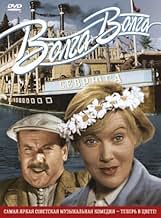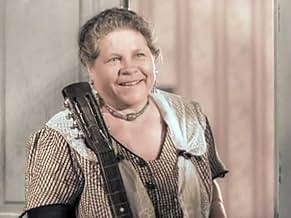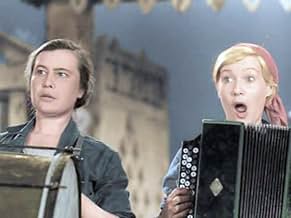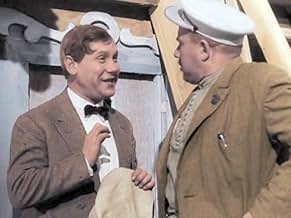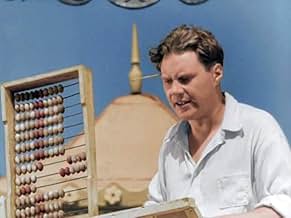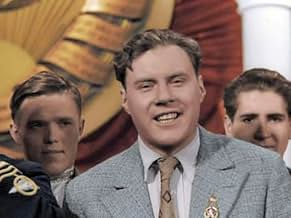VALUTAZIONE IMDb
6,6/10
827
LA TUA VALUTAZIONE
Aggiungi una trama nella tua linguaWidely claimed to be Joseph Stalin's favorite movie, this classic musical comedy is a must-see. The action takes place on a steamboat on the iconic Volga River, as two groups of performers t... Leggi tuttoWidely claimed to be Joseph Stalin's favorite movie, this classic musical comedy is a must-see. The action takes place on a steamboat on the iconic Volga River, as two groups of performers travel to Moscow to perform in the Moscow Musical Olympiad.Widely claimed to be Joseph Stalin's favorite movie, this classic musical comedy is a must-see. The action takes place on a steamboat on the iconic Volga River, as two groups of performers travel to Moscow to perform in the Moscow Musical Olympiad.
- Regia
- Sceneggiatura
- Star
- Premi
- 1 vittoria in totale
Anatoli Shalayev
- The Boy Musical Prodigy
- (as Tolya Shalayev)
Mariya Mironova
- The Secretary
- (as M. V. Mironova)
Nikita Kondratyev
- The Waiter
- (as N. S. Kondratyev)
Vsevolod Sanaev
- The Lumberjack
- (as V. V. Sanayev)
Alexei Dolinin
- The Militia Man
- (as A. G. Dolinin)
Ivan Chuvelyov
- The Olympiad Representative
- (as I. P. Chuvelyov)
Nikolai Khryashchikov
- Appearing
- (non citato nei titoli originali)
Yakov Rykov
- Tugboat captain
- (non citato nei titoli originali)
Lidiya Vinogradova
- Amateur Performer
- (non citato nei titoli originali)
Recensioni in evidenza
The insane tempo of the film made me think that I had been sitting at least 3 enjoyable hours before my TV. I use "enjoyable" in its direct sense. As a musical comedy the film is superb and can put to shame any today's production of "Stariye pesni o glavnom" calibre.
The ideology, though present, is not showing off. What the film is really showing off is talents. The talents come in battalions.
The famous chase scene, when all the dancing, playing, and singing villagers are after Byvalov, is unforgettable. I also enjoyed the race of the ships presented in a panorama view. The number of catchy phrases is also to be mentioned (we hear them now and then in our reality - this is where they come from): "Allio, garazh!", "Kantseliarskaya krysa!", "Bez vodi...", etc.
The wise use of music, the numerous gags and stunts, the powerful characters with great voice talents, etc. make this film a gem of our black-and-white era.
There is fire in their eyes and there is atomic energy in their moves while their voices are piercing quicksilver bolts.
Today to shoot such an energetic film is simply impossible. People are too lost, too sick, and too weak. Too bad the Soviet times were also out of joint. The latter adds some bitter taste to the production, which has all the rights to be called the best comedy/musical of all time.
If I am in mood for rich national energetic heavy-duty entertainment with an artistic touch, this is a perfect example to inject into my DVD player and load onto myself. The beginning and the ending of the movie are both unique (and no portrait of Stalin and demonstrations - thanks a lot!).
Mrs Lyubov Orlova is again different and again excellent.
All in all it is definitely 10 out of 10: it entertains and makes it in a most artistic and favourable way. Thank you for attention.
The ideology, though present, is not showing off. What the film is really showing off is talents. The talents come in battalions.
The famous chase scene, when all the dancing, playing, and singing villagers are after Byvalov, is unforgettable. I also enjoyed the race of the ships presented in a panorama view. The number of catchy phrases is also to be mentioned (we hear them now and then in our reality - this is where they come from): "Allio, garazh!", "Kantseliarskaya krysa!", "Bez vodi...", etc.
The wise use of music, the numerous gags and stunts, the powerful characters with great voice talents, etc. make this film a gem of our black-and-white era.
There is fire in their eyes and there is atomic energy in their moves while their voices are piercing quicksilver bolts.
Today to shoot such an energetic film is simply impossible. People are too lost, too sick, and too weak. Too bad the Soviet times were also out of joint. The latter adds some bitter taste to the production, which has all the rights to be called the best comedy/musical of all time.
If I am in mood for rich national energetic heavy-duty entertainment with an artistic touch, this is a perfect example to inject into my DVD player and load onto myself. The beginning and the ending of the movie are both unique (and no portrait of Stalin and demonstrations - thanks a lot!).
Mrs Lyubov Orlova is again different and again excellent.
All in all it is definitely 10 out of 10: it entertains and makes it in a most artistic and favourable way. Thank you for attention.
"Volga-Volga", directed by Alexandrov (Eisenstein's cameraman in "Ten Days" and other Soviet classics), is perhaps the best of a series by him that provides a Russian echo of Busby Berkeley's work in the US. Like Berkeley, Alexandrov has been attacked by some at present who see only the escapist side of this type of musical fantasy/comedy. But "Volga-Volga" also barbs "bureaucratic commissars" as did "Golddiggers of 1933" skewer "stuffy aristocrats".
Wonderful music and vaudeville-style entertainment, with Lyubov Orlova heading a talented cast, insured that "Volga-Volga" is perhaps the film most beloved by ordinary Russians ever made in the Soviet Union; it certainly was during the '30s and '40s. That Stalin presented a personal gift copy to Roosevelt during the war probably elicited the approbation "Stalin's Favorite Film". It was clear that he was proud of it, and we were allies. Today one would have to be a pretty unregenerate cold warrior or slavophobe to be offended by "Volga-Volga".
The plot: like with Berkeley, not so important. It involves a running competition (including a boat race down the Volga river) between a folk music band and a more formal village orchestra. There is singing, dancing, romance. And a happy ending.
Now you can judge for yourself. A crystal-clear VHS copy of this (and other Alexandrov '30s musicals) is distributed by Polart with easy-to-read yellow subtitles (I wish all foreign films were so graced).
Wonderful music and vaudeville-style entertainment, with Lyubov Orlova heading a talented cast, insured that "Volga-Volga" is perhaps the film most beloved by ordinary Russians ever made in the Soviet Union; it certainly was during the '30s and '40s. That Stalin presented a personal gift copy to Roosevelt during the war probably elicited the approbation "Stalin's Favorite Film". It was clear that he was proud of it, and we were allies. Today one would have to be a pretty unregenerate cold warrior or slavophobe to be offended by "Volga-Volga".
The plot: like with Berkeley, not so important. It involves a running competition (including a boat race down the Volga river) between a folk music band and a more formal village orchestra. There is singing, dancing, romance. And a happy ending.
Now you can judge for yourself. A crystal-clear VHS copy of this (and other Alexandrov '30s musicals) is distributed by Polart with easy-to-read yellow subtitles (I wish all foreign films were so graced).
When Stalin ordered Alexandrov to make this movie, he said he only wanted to see the happy images of the simple rural people along the river Volga. One could say, Stalin wanted something that would prove to him his people are happy (even if he ordered others to lie to him to make the appearance of happiness). There's no real story or plot, there's just a number of folk dances and rituals thrown together in order to entertain. It's kitch that served only one purpose - to make a dictator happy. I wouldn't even classify this movie as a comedy, it's simply a musical, or better yet a recorded account of folk dancing and singing with some attempts to moderate the time in between the musical sequences. Thus you should not even look for the depth of the characters or the story. Were it made that way Alexandrov might have even been shot! This film could not afford to be critical. IT was made in an era of Soviet history when one could not express one's self as an artist, but had to do what the propaganda machine demanded of him.
How often do film reviews of American and British films begin by mentioning such things as Winston Churchill being the 20th century's greatest mass murderer for having killing over 7 million Indians in the Indian Holocaust in Bengal; 1 million Kenyans during the Mau Mau Rebellion, and millions more in other holocausts? As to the US, it has killed more people since WW2 in wars for oil profits than the Nazis could ever have dreamed about in WW2. If you want to talk about torture (Guantanamo), gulags (prisons), and a police state where only the rich have freedom, because they can buy justice, the US should be number one on your list. Yet, while there is no mention of any of these atrocities when American and British films are reviewed. So why is it everyone has to suffer every time they read a review of a Soviet film; reciting ad nauseum supposed atrocities committed by the Soviet Union and Stalin by people who have never been there and have no idea what the reality maybe. Why can't a film review actual begin by criticizing the merits or lack of merits in a film instead?
Is Volga Volga, Soviet film propaganda? Of course, but so is all film. Films cost millions to produce. You need financing. You need distribution. For example, ever wonder why you don't see poverty in American films? Quite simple, American films are self-censored by the Bankers/Financiers. American films are created to be both escapist fantasies for those in this country and to propagate to people abroad: Look capitalism is great-everyone owns their own home, drives a brand new car, and barely works. The American film industry is so successful, I have to fight with people abroad that according to the US Census Bureau figures ½ the US population lives at or near the poverty level. Why am I bringing this up? Because it would be nice if for a change a review of a Soviet film was actually concerned with criticizing the merits of a film rather than spewing rabidly anti-communist just for the sake of it. I hope this will be my contribution to this film review.
Volga, Volga is an exciting Russian musical comedy in the vaudeville tradition of historical interest. Stalin had numerous private screenings at the Kremlin; often teasing Khrushchev of his likeness to Byvalov, the corrupt, boorish, village bureaucrat. He was so was so proud of this film, he presented it to Roosevelt as a gift. Some say it was his favorite film.
Not as well-directed as many US musicals of the time, the film is at times a bit laborious to watch, especially in the beginning; and if you're Russian you won't catch some of the humor. However, these faults are easily overcome by its sheer energy, wit, and enthusiasm.
The film is an escapist fantasy with a politically-charged message. Made at a time when Russia was becoming more urbanized and industrial, the film depicts the charms of rural life. The simple plot seems to revolve around an engaged young couple and a musical competition taking place in Moscow. They break up as each tries to compete for who gets to Moscow first to perform. There is singing, dancing, romance and of course a happy ending.
What makes Volga, Volga a propaganda film? Is the fact, the people are shown to take actions on their own accounts. The main plot, easy to miss, revolves really around Byvalov and the rural community he is supposed to serve. From the beginning, we see a corrupt, self-serving official who only cares about "moving up". Forced to ride on a slow horse, because he refused to invest in any modern vehicles, he also refuses to allow the villagers to participate in the contest, feeling they are too backwarded to be talented. This forces the villagers to take matters into their own hands. As the villagers state at the end of the film: "We are glad you laughed! Opportunists like Byvalov are petty in their thoughts and actions. They obstruct our work: We must clean all the garbage. Sweep it away."
Contrary to popular misconceptions in West, the facts are that Stalin was trying to institute elections after WW2. However, the Comitern (the Soviet parliament) refused to vote for such measures; members like Khrushchev, who by the way hated Stalin and is partially credited for the anti-Stalin lies told about him.
As most of its (all too few) viewers know, »Volga Volga« was supposed to be the Soviet counterpart to Hollywood musical comedies of the time. It is also well-known it was Stalin's favourite movie... So what? Wagner was Hitler's favourite composer does that make him a bad composer? Hitler also loved Greta Garbo, Charlie Chaplin, Marlene Dietrich... does that make them trash?
However, I *do* find it fascinating that Stalin loved this film. I find it even more fascinating that the film was released for the general public to see, and that its director wasn't sent to Siberia.
Yes, it has propaganda written all over it in the same fashion as the contemporary »Yankee Doodle Dandy« has, to mention just one famous non-Soviet example. But what makes this film such a wonderful comedy is the intelligent at times spine-chilling humour of the dialogues. However, only viewers who are familiar with the Soviet political (and general) culture of the time will appreciate them or even notice them. If one doesn't know that the young man is reciting a very famous poem by Lermontov when trying to impress the semi-illiterate political chieftain, it will be very difficult to appreciate the latter's bewildered expression and his reply: »Oh, begone with your self-critique, save it for the next political meeting« (I am quoting from memory, based on the original, not on the English translation, which I am not familiar with). Indeed, one has to know what »self-critique« meant... If you do, you'll find it a cracking-funny dialogue. The same goes for many, many other scenes like the one when the ship's cook introduces (and re-introduces) himself to the ignorant political chief, starting merrily as a »chef« and ending up as a »food-processing worker«. And then some scenes are sheer poetry: like the one when the entire village is chanting the contents of a telegram from the river bank, so that the eager recipient of the telegram already embarked on a ship - will hear it..:)
The ideology behind it is clear: only the peasants sorry, »land workers« - are healthy and wise. The only jerk in the film is the hilariously ignorant and self-important representative of the political »authorities«. This, I suppose (besides the wonderful humour and the cheerful music), is what made this film so popular with the »masses«. And this must be also the reason why the film was released. (In 1938, no less when political »purging« was at its worst.)
There are however, certain scenes in the film that make me wonder how on earth it made it past the censors. (Due to Stalin's personal intervention, no doubt?) The oddest example comes towards the end of the film, when the political chieftain is asked by the port authorities whether he is the author of the (title) song »Volga Volga«. Panicking, he not only blames someone else (»Shulbert«, Franz Schubert to you and me) regardless of the fact that »Shulbert« most definitely did NOT »do« it - but he starts screaming: »I confess nothing, I confess nothing!«, even though nobody had asked him to confess anything... Only those who know what »confession« implied can find his mindless reaction hilarious and spine-chilling.
It is said that Stalin had a copy of this film delivered to the USA authorities. They were so baffled by it that they searched it for hidden messages. If this is true, it just goes to show how little they understood and knew about each other.
Or is there a hidden message...? :)
However, I *do* find it fascinating that Stalin loved this film. I find it even more fascinating that the film was released for the general public to see, and that its director wasn't sent to Siberia.
Yes, it has propaganda written all over it in the same fashion as the contemporary »Yankee Doodle Dandy« has, to mention just one famous non-Soviet example. But what makes this film such a wonderful comedy is the intelligent at times spine-chilling humour of the dialogues. However, only viewers who are familiar with the Soviet political (and general) culture of the time will appreciate them or even notice them. If one doesn't know that the young man is reciting a very famous poem by Lermontov when trying to impress the semi-illiterate political chieftain, it will be very difficult to appreciate the latter's bewildered expression and his reply: »Oh, begone with your self-critique, save it for the next political meeting« (I am quoting from memory, based on the original, not on the English translation, which I am not familiar with). Indeed, one has to know what »self-critique« meant... If you do, you'll find it a cracking-funny dialogue. The same goes for many, many other scenes like the one when the ship's cook introduces (and re-introduces) himself to the ignorant political chief, starting merrily as a »chef« and ending up as a »food-processing worker«. And then some scenes are sheer poetry: like the one when the entire village is chanting the contents of a telegram from the river bank, so that the eager recipient of the telegram already embarked on a ship - will hear it..:)
The ideology behind it is clear: only the peasants sorry, »land workers« - are healthy and wise. The only jerk in the film is the hilariously ignorant and self-important representative of the political »authorities«. This, I suppose (besides the wonderful humour and the cheerful music), is what made this film so popular with the »masses«. And this must be also the reason why the film was released. (In 1938, no less when political »purging« was at its worst.)
There are however, certain scenes in the film that make me wonder how on earth it made it past the censors. (Due to Stalin's personal intervention, no doubt?) The oddest example comes towards the end of the film, when the political chieftain is asked by the port authorities whether he is the author of the (title) song »Volga Volga«. Panicking, he not only blames someone else (»Shulbert«, Franz Schubert to you and me) regardless of the fact that »Shulbert« most definitely did NOT »do« it - but he starts screaming: »I confess nothing, I confess nothing!«, even though nobody had asked him to confess anything... Only those who know what »confession« implied can find his mindless reaction hilarious and spine-chilling.
It is said that Stalin had a copy of this film delivered to the USA authorities. They were so baffled by it that they searched it for hidden messages. If this is true, it just goes to show how little they understood and knew about each other.
Or is there a hidden message...? :)
Lo sapevi?
- QuizFamously, this was Joseph Stalin's favorite film and he would often show off how well he knew it by performing every part just before the actors on screen.
- ConnessioniFeatured in Komediya davno minuvshikh dney (1980)
I più visti
Accedi per valutare e creare un elenco di titoli salvati per ottenere consigli personalizzati
Dettagli
- Tempo di esecuzione1 ora 44 minuti
- Colore
- Mix di suoni
- Proporzioni
- 1.37 : 1
Contribuisci a questa pagina
Suggerisci una modifica o aggiungi i contenuti mancanti


